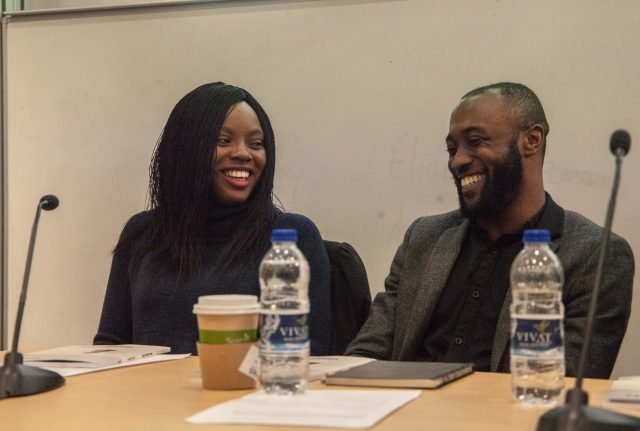
Emmanuel Iduma
Why was it important to tell the story from Akin and Yejide’s point of view, to balance the narrative in that way?
Ayọ̀bámi Adébáyọ̀
I’m interested in how deeply subjective our experience of the world and even of the same situation can be, and with this novel, I think that while it’s possible to know what happens in this marriage through Yejide’s perspective, Akin’s point of view is also essential. It’s the interplay of the two narratives that really reveals why this relationship unravels. The other thing is that the Stay With Me is a conversation between two people who are coming to terms with their shared past and reaching divergent conclusions about the possibilities in their future.
Iduma
Did you think, at any time, that your novel would be read as a feminist novel? I’m particularly interested in the fact that the novel is bookended by Yejide’s point of view.
Adébáyọ̀
I expect and do hope that it will be read that way although I didn’t give much thought to how it would be read. Mostly because there was no guarantee that it would ever be read by anyone else. Yet, although the resolution stayed the same at its core, I rewrote the final chapters several times and with each iteration it was always clear to me that Yejide would have the final word in some way.
Iduma
One remarkable quality of the novel, and I’m sure this has been pointed out to you on a number of occasions, is that anyone who understands the Yoruba language immediately recognizes that the turn of phrases are in many cases, indigenous. I imagine you were conscious of this, but I wonder if it held any challenges.
Adébáyọ̀
Yes, I was quite aware of that, particularly with the dialogue. Though the dialogue is in English, I wanted to write Yoruba into that English as much as possible. It took a while to figure out how much context I would need to give in order not to sacrifice meaning for style. Finding a way to weave that context into the narrative so the reader doesn’t really notice that I’m explaining words, metaphors and aspects of culture as we go on was also challenging.
Iduma
Yejide and Akin are coming to terms, as you write, with the “mess of love and life that only shows up as you go along.” The novel’s emotional heft in my mind comes from how all that “mess” comes together, the range of its impact. I’ve always admired how you speak about working with Akin and Yejide, listening to how they wanted their story told. How much of this is peculiar to them, how much do you hope is universal?
Adébáyọ̀
It’s a very peculiar story, I think. In that this sequence of events could only happen to two people with their particular histories and sensibilities. If Akin had married say Iya Bolu or Funmi had been his first wife, the story would have played out differently and Stay with Me would be a very different book. I believe that when you when you write about people and you do it well, no matter how specific the situation is, there will always be something about the characters, the ideas, or the situation that would resonate with someone who can’t even identify with the very specific circumstances you’ve written about. Stay with Me is about, amongst other things, love, loneliness, hope and resilience, I hope those aspects resonate with anyone that picks up the book.
Iduma
So you stay with the specific until it reveals something universal.
Adébáyọ̀
That’s how I work, yes. I do have a sense of some universal themes or issues that I want to explore but I always prefer to have a specific way in and I often wait until I find that.
Iduma
There’s a moment I remember from many years back. I turned 20, and threw a party. You were there. At those birthday parties, as you know, there was time for the celebrant to respond to difficult questions about their lives and aspirations. You asked me about my faith, something about how my faith affected my writing. Do you remember? I bring that up to ask about your universal themes. Where do they come from?
Adébáyọ̀
Yes, I remember that party. Wasn’t it at Parks and Gardens? The easy answer to your question is, I wish I knew! Recently, I stumbled on a notebook I kept in my early teens, a book of short stories and even then I was writing about things that interest me now. One of the things that struck me was a story that had a lead character named Yetunde which is not too far from Yejide. It made me wonder about where particular obsessions and concerns come from, how in this case they were present before I started paying serious attention to my craft. Most times, I can point to an image, a moment or an incident that inspired a story in some way but I’ve always wondered, and reading those old notebooks made me wonder even more, about how much of all this is beyond the purview of our conscious minds.
This is an excerpt of an interview with the author that appears in the current issue. Photograph by Immaculata Abba.































